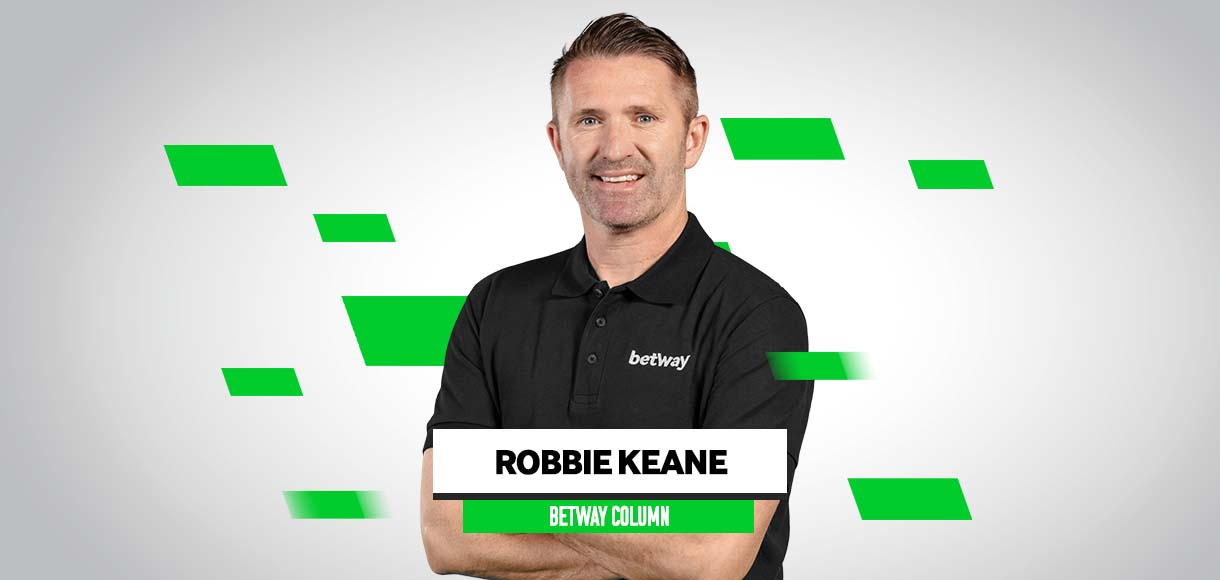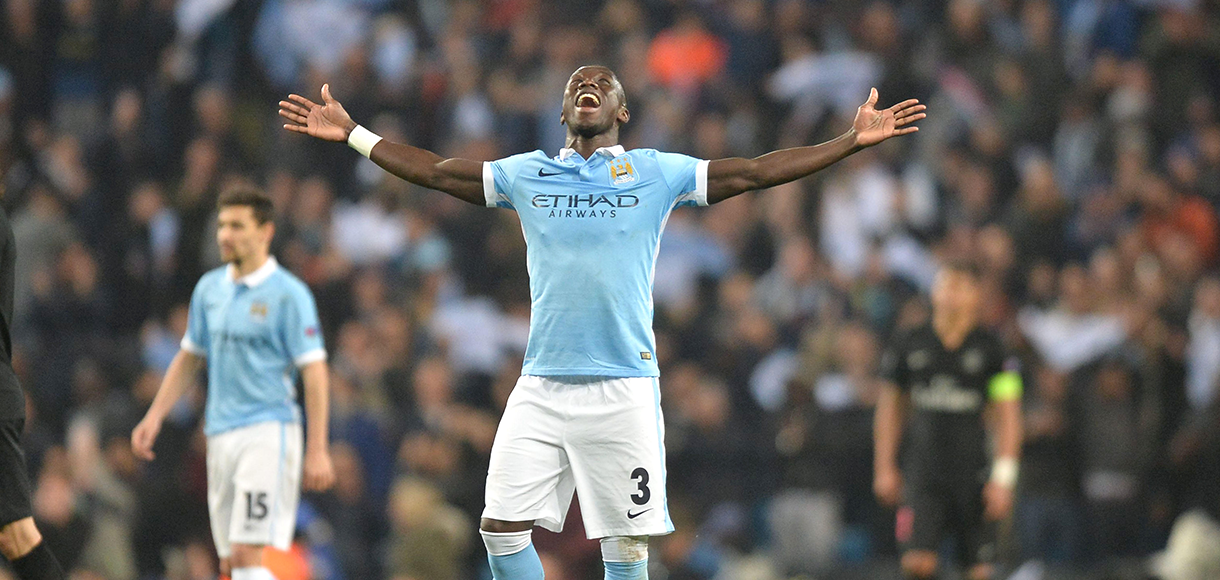Ranking the 50 greatest Champions League players of all time
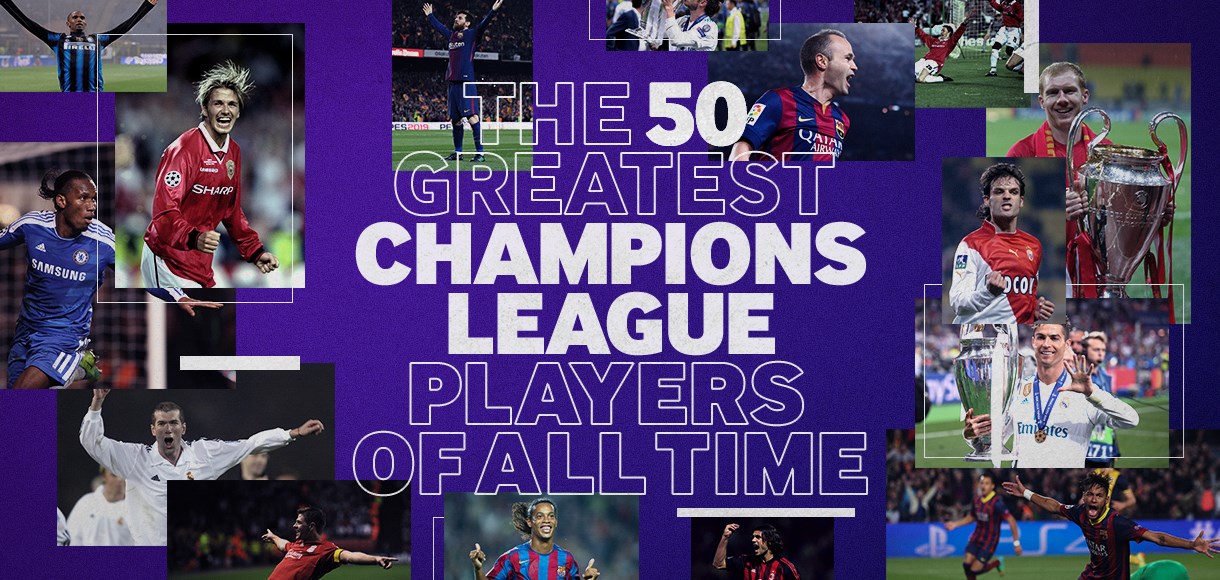
Of all the greats who have played in the UEFA Champions League, who is the greatest? Our writers decided to work it out once and for all.
Jose Mourinho once claimed the Champions League is the pinnacle of football because, unlike the World Cup, the best club teams can buy the best players in the world.
It’s certainly the only tournament in which every single one of the game’s biggest stars have competed since its inception in 1992.
Of all the greats who have played on club football’s biggest stage, though, who is the greatest?
Our writers – Tom Bowles, Tom Clee, Adam Drury, Jack Green and Will Rook – decided to work it out once and for all.
But it couldn’t be completely subjective. There had to be a system.
Firstly, we listed every player to have ever won the Champions League and appeared in the final, meaning there was no place for players like Roy Keane, Zlatan Ibrahimovic and Gianluigi Buffon.
We then ranked each one based on four categories, and gave them a score between 1-10 for each. The categories were:
Appearances
This one is simple. Players received a point for every 18 games they have played in the Champions League.
Iker Casillas was the only player to receive the full 10 points, having made 177 appearances in the competition.
Wins
Another easy one. Players were awarded two points for every time they have won the Champions League. To receive the points, they had to have played in the final.
Only one player received the full 10 points: five-time winner Cristiano Ronaldo.
Iconic moments
This category is all about the moments that instantly come to mind when talking about these players. Think Ronaldinho’s toe poke against Chelsea, or Steven Gerrard’s thunderbolt against Olympiakos.
Our brains trust awarded points based not just on how iconic these moments were, but also how many a player has had in their career.
For example, Ole Gunnar Solskjaer received eight points based entirely on his winner in the 1999 final. Sergio Ramos also received eight points because, while he hasn’t had a moment as singularly memorable as Solskjaer’s, he has scored several important goals for which he deserves to be rewarded.
Legacy
The final category is all about how we reflect on these players’ Champions League careers.
We awarded points based on how integral players were to their teams’ success, any accolades or milestones that they earned, and how they are remembered today.
Influential players who immediately come to mind when thinking of great sides – like Xavi, Sergio Ramos and Kaka – scored well in this category.
The players who didn’t fare quite as well were the ones who played lesser roles and were overshadowed by better players in their team, such as Karim Benzema.
Adding the four categories together gave each player a total score, and we used our discretion to break any ties.
So, here it is: our list of the 50 greatest players to have ever played in the Champions League.
50. THOMAS MULLER
Raumdeuter (noun): interpreter of space, Thomas Muller.
Not quite a striker, but not quite a number 10, Muller literally invented his own position.
He is, in the words of Germany manager Joachim Low, "a very unorthodox player" who is "impervious to pressure".
As much was evident when he swept into the box to head Bayern Munich ahead in the 2012 Champions League final at his home ground.
It was a goal that ultimately counted for nothing, but, having returned to win the trophy the following year, he deserves the opening spot on this list. WR
49. ERIC ABIDAL
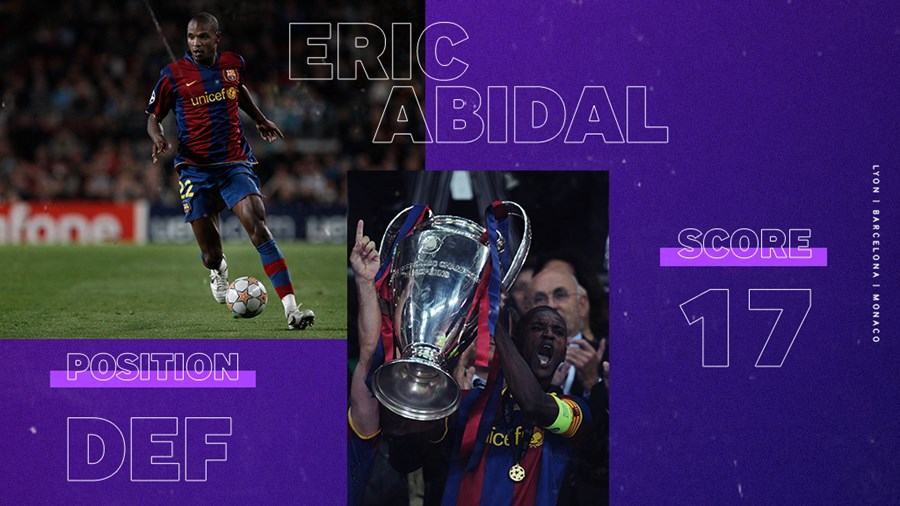
Sport normalises physical pain and suffering, which is why 'fractured metatarsal', 'torn cruciate ligament' and 'ruptured Achilles' are considered standard football phrases, just like 'schoolboy defending', 'must-win game' and 'fuck off VAR'.
Occasionally, though, something happens that is significant enough to remind fans and pundits that footballers are, in addition to highly-paid athletes, human beings.
In March 2011, Abidal, Barcelona’s first-choice left-back, underwent surgery after being diagnosed with a tumour in his liver. To summarise, he had cancer.
Three months later, his club dismantled Manchester United to win their second Champions League title – and treble – in three seasons.
Remarkably, Abidal played the full 90 minutes.
In recognition of his comeback – reminder: he had cancer – Carles Puyol gave Abidal the honour of lifting the trophy first, a moment the legendary Barcelona captain later described as the most special moment of his club career. TB
48. JAVIER ZANETTI
Gavin and Stacey’s Uncle Bryn told us: "It’s not how old you are, it’s how you are old," and that’s certainly the case with Zanetti.
The Argentine spent 19 years at Inter Milan, 13 of them as captain, but it’s the final few that earned his place in this list.
Zanetti led Inter to their 2010 Champions League triumph at the age of 36, making him the second-oldest winning captain in the competition’s history.
Most players move backwards on the pitch as they grow older, but Zanetti was so key a figure in that Inter side that he switched from full-back to central midfield in 2006.
Perhaps the best measure of Zanetti’s influence, though, is how Inter have performed since his retirement.
They’ve only been in the Champions League once in the five years since he called it a day. JG
47. FERNANDO HIERRO
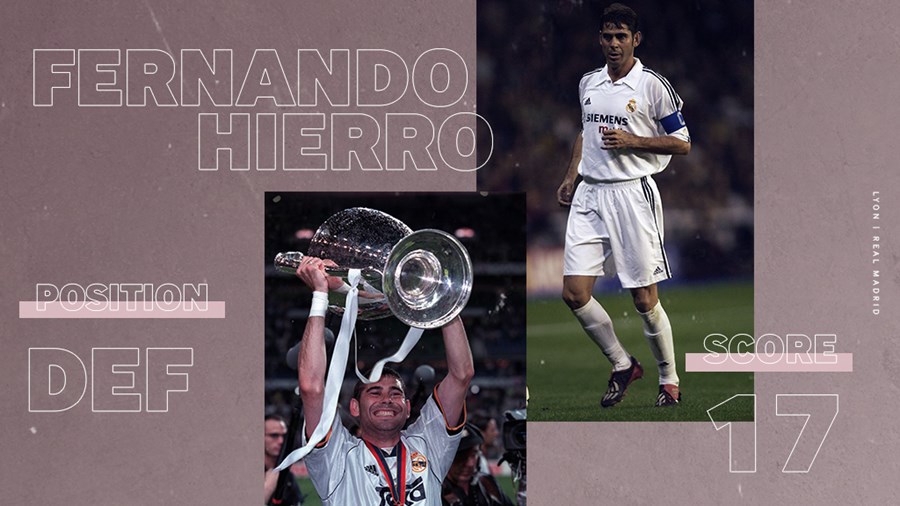
When you think of the Real Madrid side of the early-2000s, you think Galacticos.
Zidane. Ronaldo. Figo.
In a team that was all about the glamour, though, the man whose name means ‘Iron’ in Spanish doesn’t get enough credit.
Hierro was a fixture in the centre of Real’s defence for 14 years and won the Champions League three times, including as captain in 2002.
The Spaniard was also a lovely passer at a time when centre-backs were expected to lump the ball downfield whenever they found it at their feet.
He didn’t have the grace of Zidane or the free-kicks of Roberto Carlos, but he was just as essential to that team. JG
46. ANDREA PIRLO
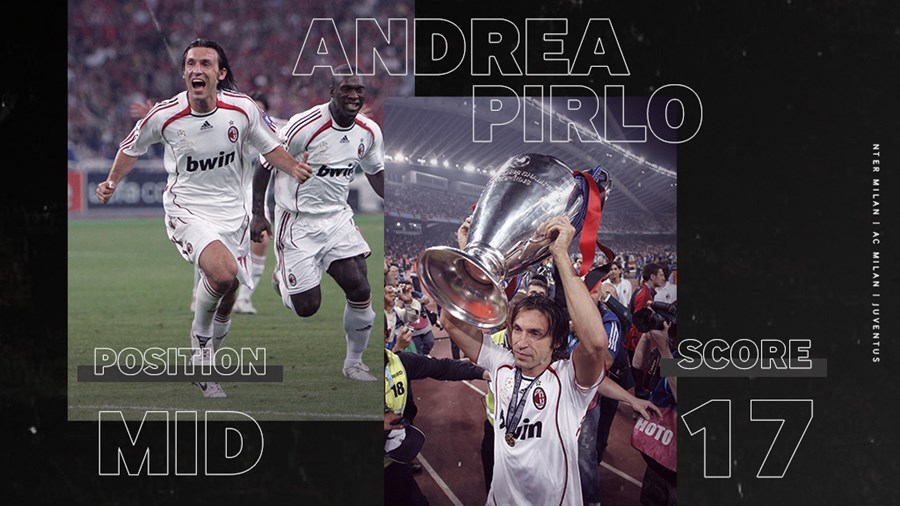
If this was a list of the greatest players of the past 30 years – or of football’s finest hair/beard combos – Pirlo would obviously feature much higher.
It isn’t, though, and the Italian’s most iconic moments undoubtedly came in the shirt of his national team.
Nevertheless, his influence in this competition shouldn’t be underestimated.
He played in four finals 12 years apart and was the creative fulcrum for AC Milan in both their 2003 and 2007 triumphs.
Pirlo gained a reputation as an ice-cold penalty taker after knocking England out of Euro 2012, and his miss in the 2005 final against Liverpool has therefore gone under the radar.
He’s perhaps a Panenka in that final short of a much higher place on this countdown.
Sorry, Andrea. JG
45. NEYMAR
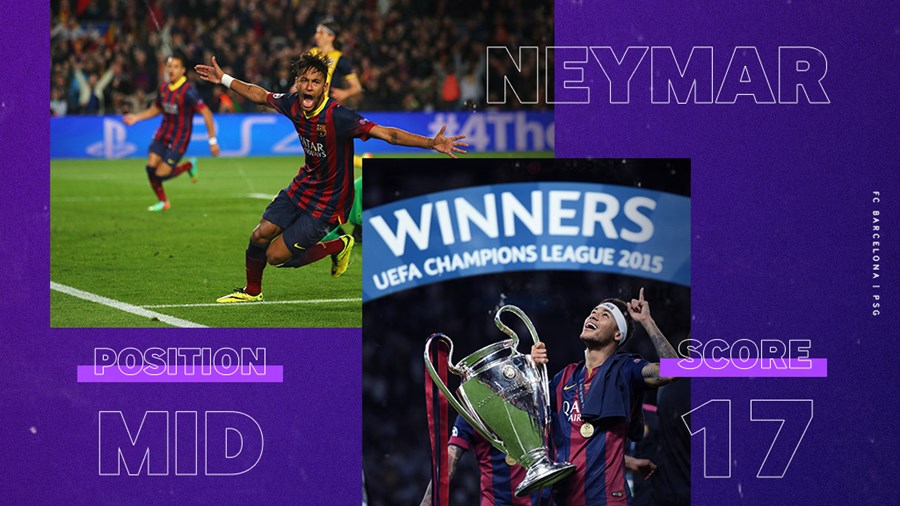
When somebody routinely dominates the conversation – whether villain, hero, or in an apathetic middle ground – something is going right.
PSG bought Neymar in 2017 to win them the Champions League, and so far – through his own injury, faults and the faults of others – he has failed.
But his legend in this competition remains.
In 2016, the Brazilian masterminded the greatest comeback the knockout stages have ever seen, scoring in the 88th and 91st minutes before setting up Sergi Roberto’s winner in Barcelona’s 6-1 victory (from 4-0 down in the first leg) against PSG.
Even apart from his eyewatering skill, his ability to produce at crucial moments – he, unlike Lionel Messi, scored when Barcelona beat Juventus in the 2015 final – gets him into the top 50, and could push him higher in years to come. AD
44. ALESSANDRO NESTA
How often does a clip of defending go viral on social media?
Liverpool fans revelling in a Virgil van Dijk interception, perhaps, or Phil Jones putting his head in where it hurts and pulling a funny face.
So, a two-minute compilation of Alessandro Nesta’s tackles and blocks popping up on Twitter earlier this month – 3.4k likes and counting behind it – says something.
Its contents were not just great defending, but aesthetically-pleasing defending. Nesta hardly seemed to dirty his shorts when sliding to win back the ball, or physically touch an opponent when pickpocketing possession.
It is that style, as well as the exemplary results, that explains how he won two Champions League titles, and why he will always exist on anybody’s list of great centre-backs. AD
43. DAVID BECKHAM
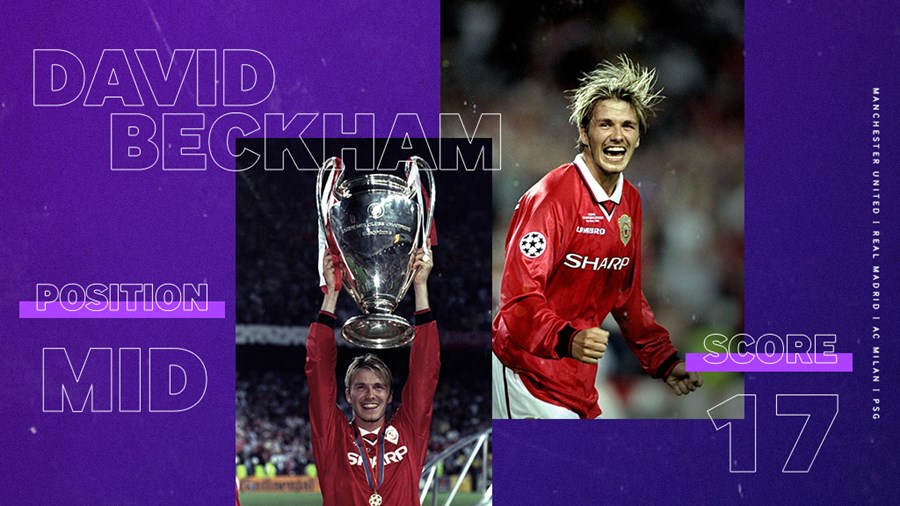
It’s easy to forget that before Beckham prioritised fame over football, which happened around the time he moved to Real Madrid in 2003, he was one of football’s best players.
He was Manchester United’s most outstanding player in their Champions League-winning treble season in 1998/99. He provided crucial assists in the quarter- and semi-finals, and was the only one to play anywhere near his best in the final against Bayern Munich, whipping in the two stoppage-time corners that flipped the game from glorious failure to incredible victory.
Those performances propelled him to second in the 1999 Ballon d’Or, with Michael Owen the only English player to finish above him in the last 40 years. TB
42. CASEMIRO
Casemiro is not very Real Madrid.
All of Los Blancos’’ 20 biggest signings have been forward-thinking players, with their most expensive defensive player, Xabi Alonso, hardly a roll-your-sleeves-up tough guy.
So, when Zinedine Zidane needed a midfield foil for Luka Modric and Toni Kroos in the latter stages of the 2015/16 Champions League, the Brazilian – who had been on loan at Porto a year previously – would have to do.
He has proved more than adequate.
When ranking players that Real couldn’t have won three consecutive European titles without, Casemiro must come close to the top of the list.
His grit, graft and selflessness are not traditional Real Madrid traits, but are necessary in a side that made a habit of scraping through by the skin of their teeth.
His three titles are reward for those unheralded efforts. AD
41. WAYNE ROONEY
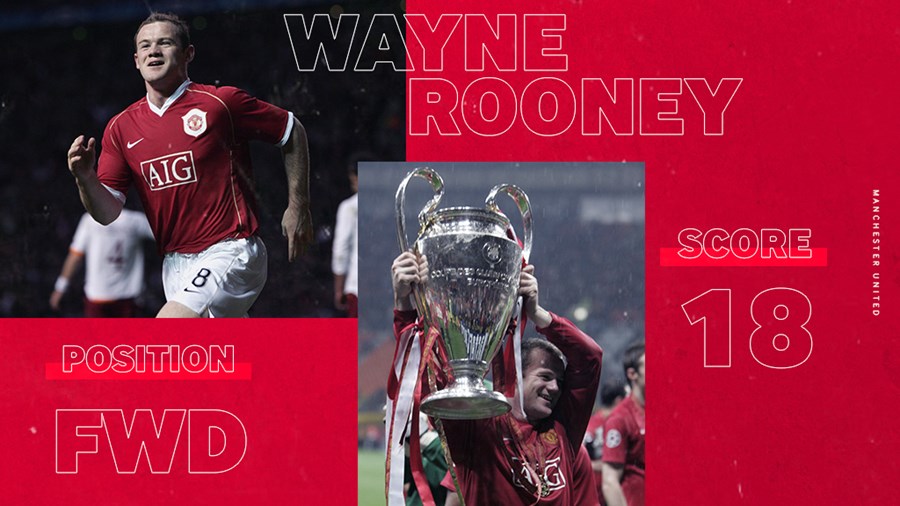
Rooney won the Champions League in 2008, but it was two matches either side of that final, both against AC Milan, that captured the two personal heights of his club career.
The first was the semi-final first leg at Old Trafford in 2007, where Rooney scored a brilliant late brace to reaffirm his status as a rival to Lionel Messi and Cristiano Ronaldo as the world’s most prodigious talents.
The second was a knockout game at the San Siro two years later, where Rooney powered home two headers as United won 3-2.
While no longer able to keep pace with Messi or Ronaldo – no shame there – he was, for that 2009/10 season, the finest centre-forward in Europe. TB
40. KEYLOR NAVAS
The curious case of Keylor Navas, the goalkeeper who almost accidentally became a three-time Champions League winner.
OK, so not quite.
But if Real Madrid had their way, and a fully functional fax machine, it would be David De Gea with his name to those honours.
Originally signed as backup to Iker Casillas after the 2014 World Cup, Navas claimed the No. 1 spot after his departure and the breakdown of De Gea’s move the following year.
That he managed to keep it for four years in the most successful ever Champions League side, when the club had multiple opportunities to replace him, means the Costa Rican is worthy of his place. WR
39. DANI ALVES
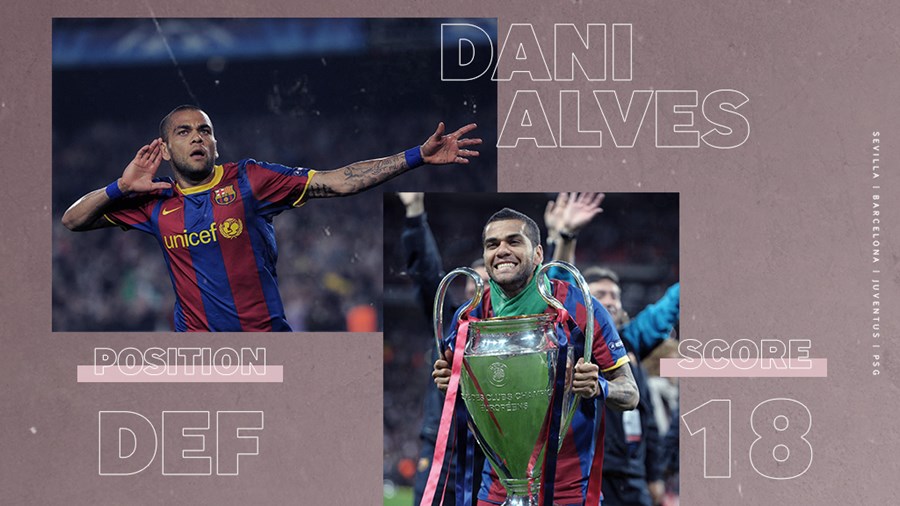
Dani Alves was a winger through childhood, before his lack of goals convinced his dad to convert him into a full-back.
And despite becoming the most decorated player in the history of football, including winning two Champions League titles, his legacy is how he applied the attributes of a winger to a defensive role.
Alves was one of Pep Guardiola’s first signings for Barcelona and soon became a trusted lieutenant. Guardiola could rely on him to lock down the right-hand side, stretching the pitch to create space for Lionel Messi and Andres Iniesta, as well as providing countless assists.
Though attacking full-backs existed before him, his template is now being followed by several more. Not many of them will be able to replicate his trophy cabinet. AD
38. OLE GUNNAR SOLSKJAER
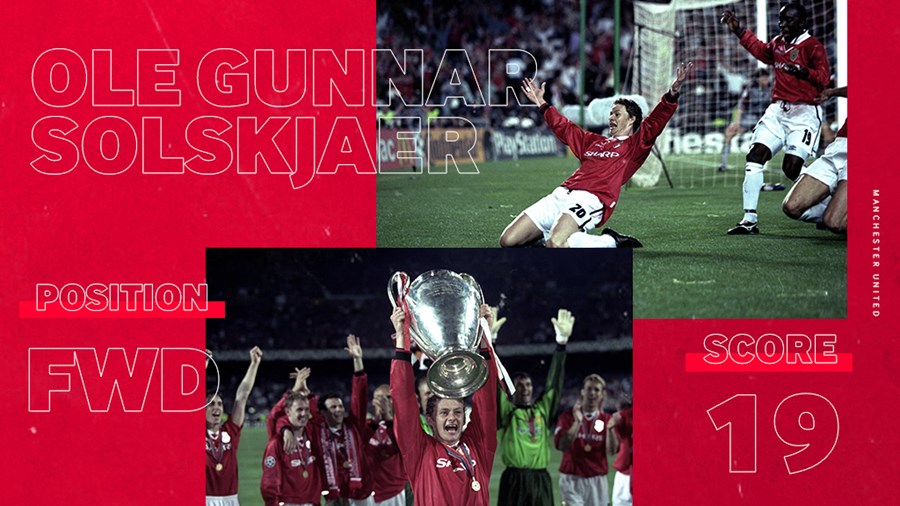
Solskjaer’s 93rd-minute winner against Bayern Munich is the most iconic moment in Champions League history.
His finish – an instinctive toe poke that was harder than it looked – meant Manchester United won not just the Champions League, but the treble, a feat achieved by no English club either before or since.
The goal secured the legend of Solskjaer – he would never have got the opportunity to manage United without it – Sir Alex Ferguson, who finally realised his greatest ambition of conquering Europe and Clive Tyldesley, whose line ‘And Solskjaer has won it!’ is such an iconic piece of commentary that it feels incomplete to watch the goal without it. TB
37. PAUL SCHOLES
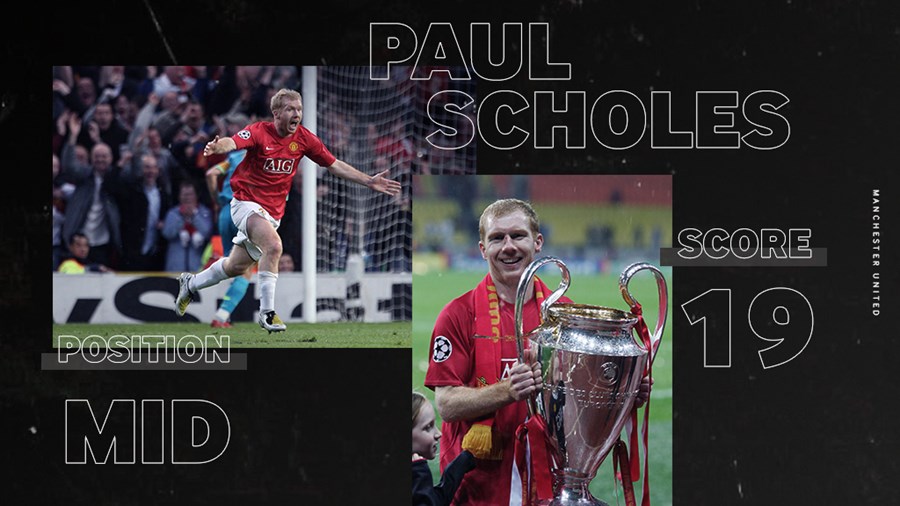
Scholes’ 25-yard volley against Barcelona in 2008 is the most iconic Champions League goal scored by a Manchester United player not named Teddy Sheringham or Ole Gunnar Solskjaer.
Latching on to a misplaced pass, Scholes’ imperfect first touch was followed by a perfect second one: his right boot cutting across the ball just as it bounced so that it spun away from Victor Valdes’ hands and nestled itself into the top right corner.
The strike got United to the Champions League final – which they won, beating Chelsea on penalties – and provided a moment of redemption for Scholes, who missed the final against Bayern Munich through suspension nine years earlier.
Having been one of the competition’s best midfielders for more than a decade, it was nothing less than the then-34-year-old deserved. TB
36. THIERRY HENRY
Henry won the Champions League with Barcelona in 2009, but his greatest moments in the competition undoubtedly came during his time at Arsenal.
The hat-trick against Roma in the Stadio Olimpico in 2002. The brace in a 5-1 rout of Inter at the San Siro in 2003. And, of course, the slaloming match-winner at the Bernabeu to knock out Real Madrid in 2006.
Dragging a side that heavily featured Mathieu Flamini and Emmanuel Eboue all the way to the final that season was Henry’s finest Champions League achievement.
Patrick Vieira had left the club, Ashley Cole was injured for much of the season and Dennis Bergkamp was barely involved at the age of 36.
So while doubters will always point to the fact that Henry never scored in a major final – a valid criticism – that goal, that tie and that season confirmed his place as a Champions League great. JG
35. FRANK LAMPARD
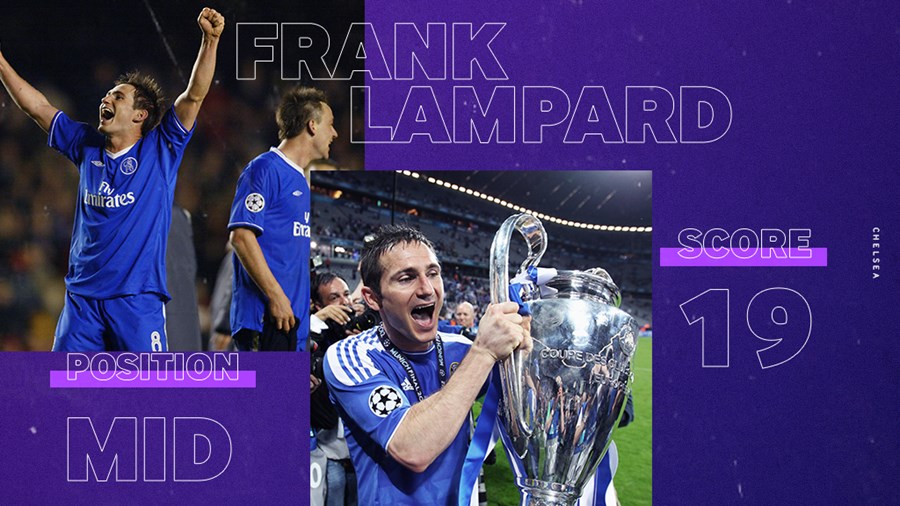
When Chelsea finally got their hands on the Champions League trophy – having previously made four semis and a final – Lampard was the only player on the pitch who had been there from the start.
He was a man for the big occasion, with 15 of his 23 goals coming in the knockout stages and a perfect personal record in three penalty shoot-outs.
So when, four years after that infamous slip, John Terry was suspended for the final in 2012 following a petulant sending off, it felt fitting that it was the Blues’ true European talisman who was wearing the armband. TC
34. DIDIER DESCHAMPS
Before Deschamps became a World Cup-winning manager, he was a Champions League-winning captain.
The youngest one ever, in fact.
The Frenchman was just 24-years-old when he led Marseille, who remain the only French side to ever win the Champions League, to the inaugural title in 1993.
Not content with that, he went back and won it again with Juventus in 1996.
Along with Franz Beckenbauer and Iker Casillas, Deschamps is one of just three captains in the history of football to lift the World Cup, European Championship and Champions League (or European Cup) trophies.
He was nicknamed the ‘water carrier’ by Eric Cantona due to his functional style of play, but his trophy cabinet suggests he was much better than that. WR
33. FERNANDO MORIENTES
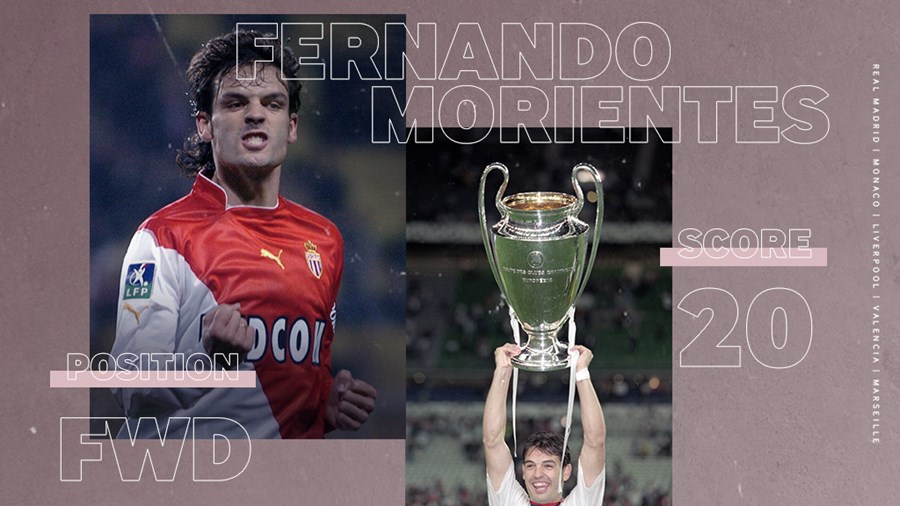
Morientes won the Champions League three times in five years at Real Madrid between 1998 and 2002, serving as part of one of the most formidable strike pairings in Europe.
If Raul didn’t get you, he would.
But the arrival of Ronaldo at the Bernabeu in 2002 saw Morientes ousted and eventually shipped out on loan to Monaco a year later.
He had the last laugh, though.
Meeting his parent club in the 2003/04 Champions League quarter-final, Morientes made them look silly.
He scored two goals and assisted one over the tie, helping Monaco overturn a 4-2 deficit from the first leg and put Real Madrid out on away goals.
And no, he did not hold back with his celebration.
Have that, Galacticos. WR
32. XABI ALONSO
Having played for three of Europe’s most-successful sides, Alonso's Champions League record ought to be better.
After lifting the trophy in his first season at Liverpool, he only won one more medal, in 2014, when he was suspended for his last game as a Real Madrid player.
While he moved to Bayern, Real won three of the next four, leaving Alonso with six semi-final defeats and one runners-up spot to his name.
A pity, maybe, but he serves as a reassuring reminder that, even in an era of super clubs and freakish players, this remains an incredibly difficult trophy to win. TC
31. OLIVER KAHN
You don’t mess with Oliver Kahn.
His fearsome demeanour and hands like satellite dishes earned him the nickname ‘The Titan’ during his 14-year stay at Bayern Munich, the highlight of which undoubtedly came against Valencia in the 2001 Champions League final.
The game had gone to penalties after a 1-1 draw.
Kahn saved three spot kicks to win it for his side, celebrating each with a roar more vein-popping than the last.
If his intimidating penalty-box manner was anything to go by, the ball would probably have been too scared to go past him anyway. WR
30. ASHLEY COLE
It was some show of respect when Sir Alex Ferguson chose to deploy Cristiano Ronaldo on the left for the 2008 Champions League final, rather than risk him being shackled by Cole.
The Portuguese had already scored 41 goals for Manchester United that season, and added another after towering above stand-in right-back Michael Essien to condemn Cole to a second losers' medal.
When Chelsea finally did win it in 2012, it was their senior players who took most of the credit and, having marshalled a defence containing Jose Bosingwa, David Luiz and Gary Cahill, nobody did more of the heavy lifting than Cole. TC
29. FILIPPO INZAGHI
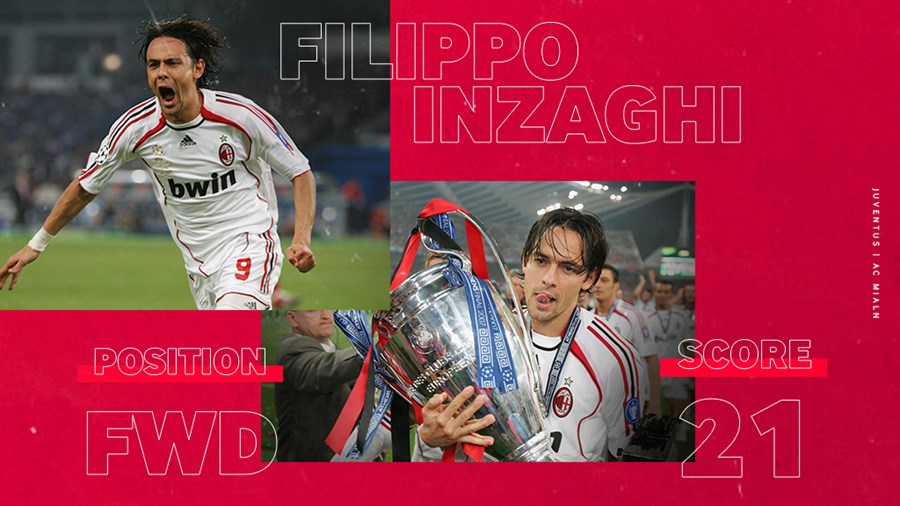
Of the 10 players on our list to score more than 40 Champions League goals, only Cristiano Ronaldo and Lionel Messi boast a better strike rate than 'Pippo' Inzaghi, which isn’t bad for a man who was born offside.
His goals were rarely beautiful – though always celebrated emphatically – but that's not to say that others could easily have scored them.
His first in the 2007 final, often dismissed as a lucky deflection, is a prime example, given Inzaghi was only in the trajectory of Andrea Pirlo’s free-kick after instinctively peeling off the wall to snaffle up any rebounds. TC
28. GERARD PIQUE
Pep Guardiola once described Pique as his best signing, though it's tempting to say he shouldn't really count.
A proud Catalan who grew up in La Masia, there was a sense of serendipity when he returned to slot into Barcelona's largely homegrown side in 2008 – particularly after he won his first two Champions Leagues against the side who were willing to let him go for just £5m.
Pique lined up in those matches alongside Yaya Youre and Javier Mascherano – midfielders by trade – and, by the time he won a third title against Juventus in 2015, he was the only defender to have started all three finals. TC
27. PEDRO
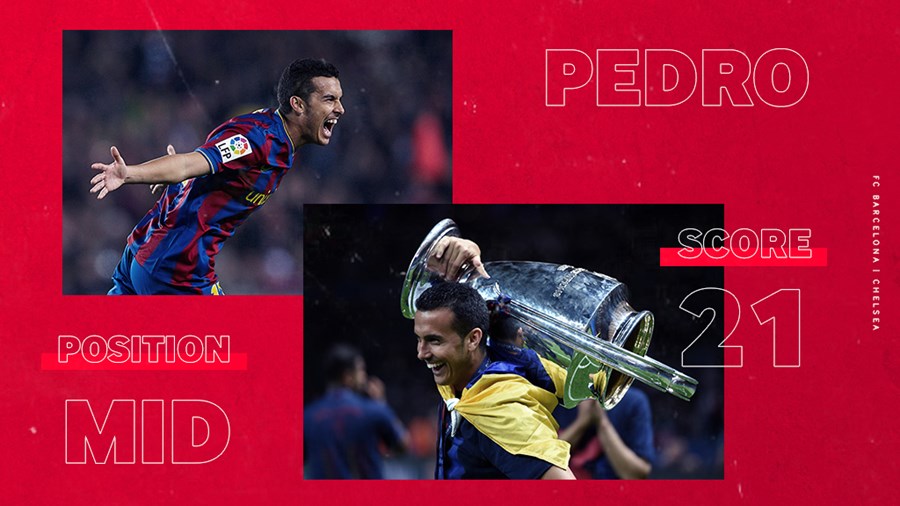
List the great 2010/11 Barcelona team and Pedro would probably be last, and not just because he played on the left-hand side of the attack.
The Spaniard – who figured in the great ‘MVP’ triumvirate – was the most dispensable of the three. If Lionel Messi and David Villa were the headline act, you’d nip for a slash and another beer while Pedro was playing his warm-up set.
But a comparison to Messi doesn’t reflect well on anybody, so it is also fair to view Pedro’s achievements in isolation.
A goal for the greatest team ever in that 2011 Wembley final against Manchester United, an appearance in another winning final in 2015, and the first Spaniard to score in a Champions League final, Europa League final, Super Cup and Club World Cup final is good by most people’s standards. AD
26. ARJEN ROBBEN
Every superstar needs a signature move.
Johan Cruyff had the ‘Cruyff turn’, Ronaldinho had the ‘Elastico’, and Luis Suarez has the ‘bite the opponent’s arm’.
No player has relied as heavily on their trademark, though, as Robben.
And why not? The winger was essentially impossible to stop when he cut in from the right wing and unleashed a left-footed strike at goal.
That technique was responsible for plenty of his 31 Champions League goals, many of them scored in crucial knock-out games for Bayern.
And while his scrappy winner in the 2013 final wasn’t a classic Robben finish, it did display the ruthlessness and eye for goal that made him the archetypal inverted winger. JG
25. LUKA MODRIC
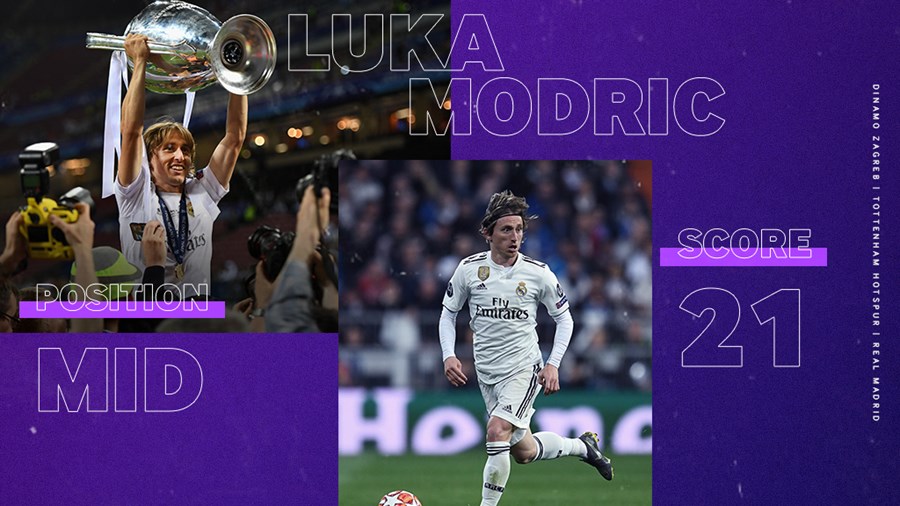
The greatest compliment you can give Modric is that today’s Europe-conquering version of Real Madrid would be impossible without him.
Think of the numerous moments in which they pulled games back from the edge of disaster.
Sure, other more glamourous players took the credit, but Modric’s calming, never-give-the-ball-away presence has been integral in each of those.
He possesses phenomenal passing range, can play with both feet and has been described by Predrag Mijatovic as the best footballer in the history of the Balkans.
Jorge Valdano, meanwhile, once wrote: “When the ball passes by his feet, the play flows as if football was the easiest thing in the world.”
It’s characteristics like those that helped the Croat become the first player to win the Ballon d’Or since 2007 who wasn’t called Lionel Messi or Cristiano Ronaldo. WR
24. ANDRIY SHEVCHENKO
Come for Milan, stay for Kiev.
Shevchenko’s performances at Milan make him one of the Champions League’s finest ever strikers, the highlight being his winning penalty in their shootout win over Juventus in 2003.
But it’s what he did at Dynamo Kiev that sets him apart from the competition’s other iconic goalscorers.
A year after scoring a hat-trick in a 4-0 win over Barcelona at the Nou Camp, Shevchenko was the Champions League’s top scorer in 1998/99 after his goals propelled Kiev to the semi-finals. That achievement was impressive at the time, but looks even better 20 years on in the era of super clubs.
The highlight of Kiev’s campaign was their 3-1 aggregate win to knock out defending champions Real Madrid in the last eight.
Shevchenko, naturally, netted all three. TB
23. KARIM BENZEMA
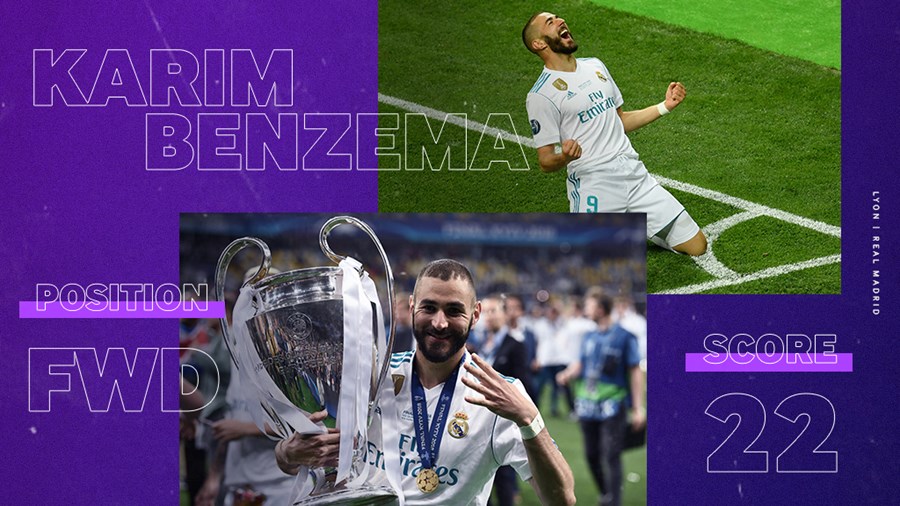
“People judge Benzema just on the amount of goals he scores, but he is demanding and loyal” – Florentino Perez, 2017.
“Benzema’s intelligent movement creates the space on which the club’s record scorer thrives” – Marca, 2017.
“Benzema will not score 50 goals a season, but I like what he does for the team” – Zinedine Zidane, 2017.
“You had a rocket (Bale) and a goalscorer (Ronaldo), and then there was me, the piece that made it all work” – Karim Benzema, 2019.
Benzema did plenty more than facilitate Cristiano Ronaldo. But if that is what he’s remembered for, having won four Champions league titles and scored in the 2018 final, there are worse legacies. AD
22. RYAN GIGGS
More renowned now for his endurance rather than his outstanding ability, it’s easy to overlook that Giggs made vital contributions to both of Manchester United’s Champions League triumphs.
His scuffed right-footed effort was turned in by Teddy Sheringham to level the game against Bayern Munich in 1999, while he also scored the decisive penalty in United’s shootout against Chelsea nine years later.
That game in Moscow, where he matched Sir Bobby Charlton’s all-time United appearance record before converting in the shootout, was a prime example of not just his longevity, but his ability to make a difference. TB
21. DIDIER DROGBA
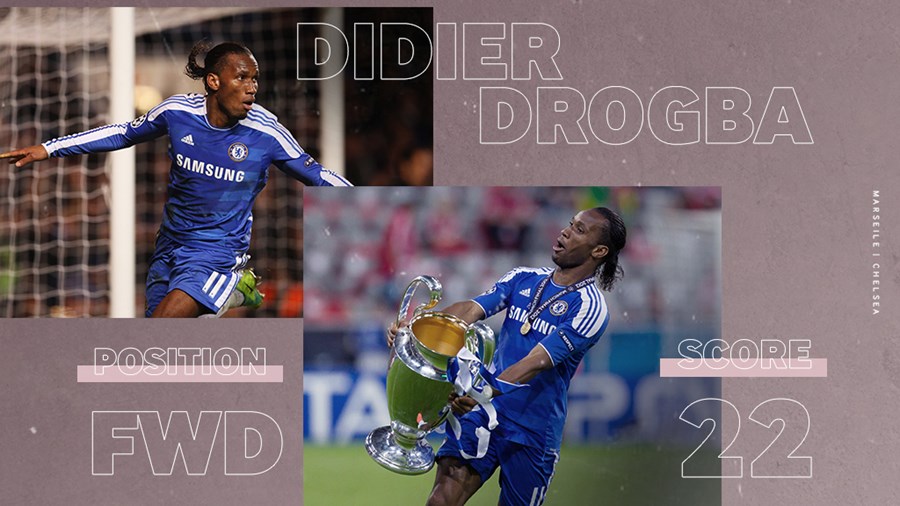
Drogba doesn’t quite crack the top 20, but his spot on the list is certainly no “fucking disgrace”.
The Ivorian’s rant at the camera after Chelsea were dumped out by Barcelona in 2009 could easily have been his most iconic moment in the competition, but he outdid himself three years later.
Chelsea were losing 1-0 to Bayern in the 2012 final when Drogba arrived just in time – as he did so often in his career – and powered home an 89th-minute header.
He then stepped up for the decisive penalty in the shoot-out. One step. Bang.
There was never any chance he was going to miss. Drogba always produced under pressure. JG
20. SERGIO BUSQUETS
Busquets doesn’t possess the flair or creativity of his Barcelona team-mates.
He is, in his own words, unremarkable, “I’m in a position where I’m not always noticed. I don’t score goals or do much dribbling.”
So it seems bizarre that he has managed to own his spot in the best football team of a generation, playing the entire game in each of the three Champions League finals Barcelona won between 2009 and 2015.
The brilliance of Busquets, instead, is in the simplicity of his skill set: consistently making the right decision.
He is a throwback in a team of international superstars and Youtube footballers, but plays a fundamental role in almost everything on the pitch.
Former Spain manager Vicente del Bosque once said of him: “If you watch the game, you don’t see Busquets. But if you watch Busquets, you see the whole game.” WR
19. RONALDINHO
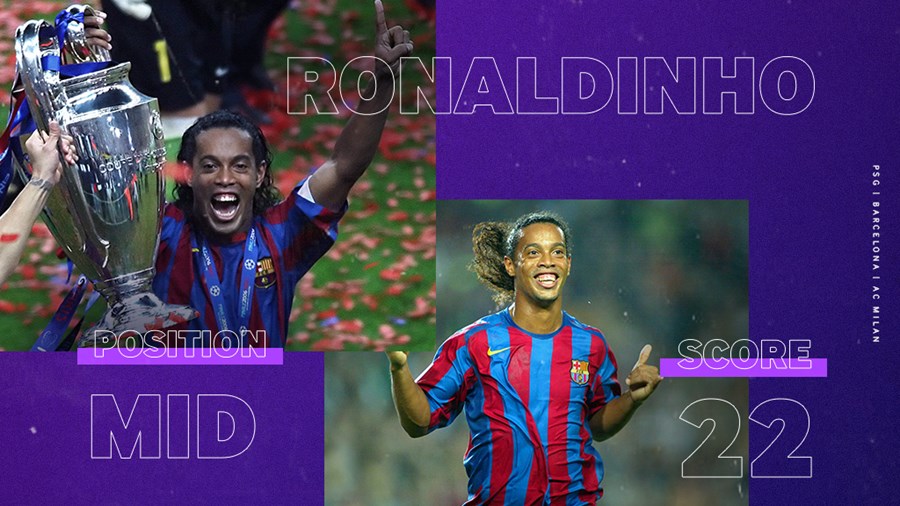
A shuffle of the hips. A mere suggestion of a backlift. The ball arrowing into the corner of Petr Cech’s net.
Ronaldinho’s toe poke at Stamford Bridge is one of the great Champions League goals. Not just because of the absurd skill, but because there hasn’t been one like it since.
It seems counterintuitive that a master technician’s finest moment came from the school playground, but that was Ronaldinho – the first ever YouTube footballer, who so often produced the unfathomable.
The Brazilian’s skills and goals were obsessed over by a generation of young football fans, and his ‘crossbar challenge’ Nike advert was the first video ever to hit 1,000,000 views.
That video was heavily edited, but it was hard to tell, given most of his goals seemed like they had to be the product of camera trickery. JG
18. MARCELO
It is possible to be considered the best player in the world at your position and simultaneously underrated?
Case in point: Marcelo.
While the Brazilian would top most football fans’ lists of the game’s best left-backs, his influence in Real Madrid’s four Champions League wins is still overlooked.
From scoring the third goal of the 2014 final against Atletico to producing an outstanding performance against Bayern in the 2017 quarter-finals, Marcelo was as consistently brilliant over that five-year, trophy-laden spell as almost any other Real player.
The defensive mishaps that plagued his early years at the Bernabeu are now much rarer. The 31-year-old can now do it all – overlap, underlap, cross and tackle.
In 2012, he was named Roberto Carlos’ heir by the man himself.
Speaking of which… JG
17. ROBERTO CARLOS
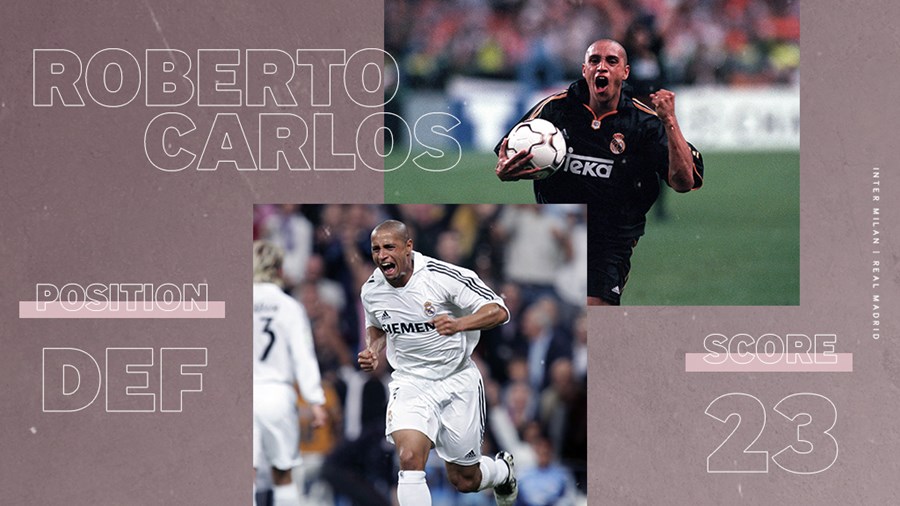
There probably wouldn’t be a Marcelo if it wasn’t for Roberto Carlos.
It’s easy to remember the former Galactico for his free-kicks, and rightly so, as every young football fan in the late 1990s tried at least once to emulate his unique blend of power and swazz.
What really sets Carlos apart from his modern-day equivalent, though, is that there just wasn’t anyone like him in his day.
He was one of the most exciting players in the world, despite playing in what was by far the game’s most unfashionable position.
Unlike the other great full-backs of the time, like Paolo Maldini and Lilian Thuram, Carlos’ game would still translate perfectly to how teams set up in 2019.
There are plenty of Marcelo-lites in football today. There was only ever one Roberto Carlos. JG
16. CARLES PUYOL
God loves a trier, so perhaps that’s why he rewarded Carles Puyol with three Champions League titles.
Aware of the frightening standard around him at Barcelona, Puyol would train extra hours to make up for his technical shortcomings, before hitting the gym to ensure that he would win the physical challenges he so often threw himself into.
As a result, he provided brawn and ruggedness to a Barcelona team that generally passed and moved their way to victories.
And when leadership was required, that bit came easily. Ex-Barca coach Frank Rijkaard once said that he could replace the Spaniard at the heart of his defence, but not as the heart of the team.
“I’m like the student who is not as clever, but revises for his exams and does OK in the end,” Puyol once said about himself.
The skipper was no underperformer, but his understated view of himself sums up his contribution to Barcelona. AD
15. STEVEN GERRARD
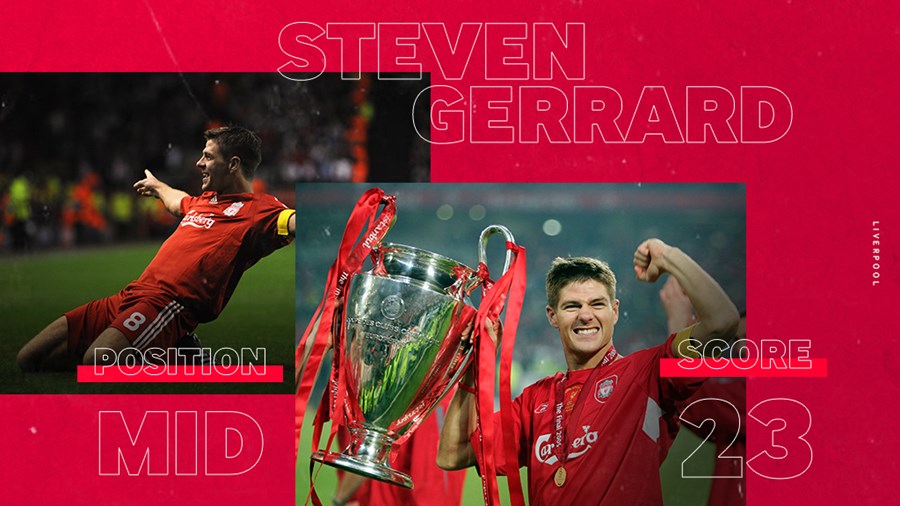
If the night of 25 May 2005 was one that created Liverpool legends, then Steven Gerrard should be made the patron saint of Anfield.
He had already performed heroics to get his side through the group stage in the first place, almost breaking the net with a decisive goal against Olympiakos on one of those nights.
Yet the local-boy-turned-captain rewrote footballing logic once again to drag his side through one of the most remarkable comebacks sport has ever seen.
Three-nil down to AC Milan at half time, there was no hope.
But nine minutes into the second half, Gerrard’s looping header past Dida gave Liverpool all the belief they needed.
Within six minutes, they were level.
After another hour, European champions for the first time in 21 years.
Ya beauty. WR
14. KAKA
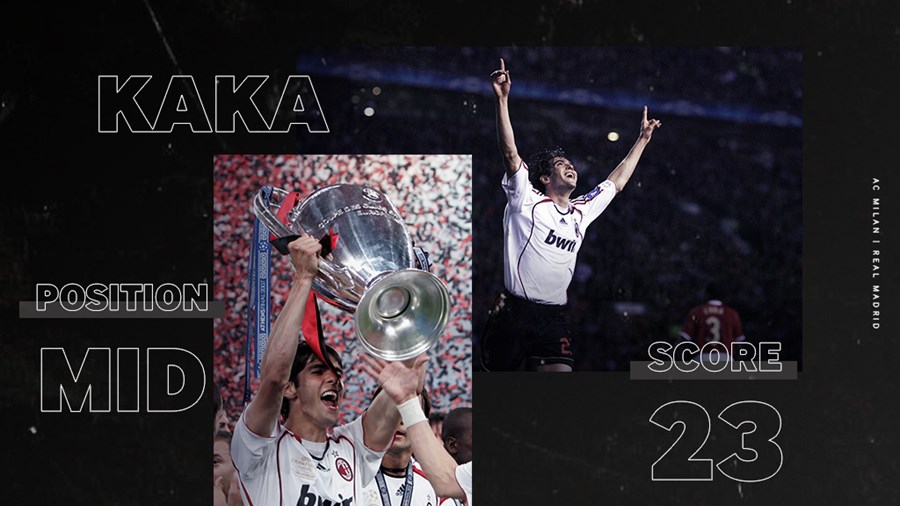
One motion in the 44th-minute of the 2005 Champions League final sees Kaka into the top 50 on its own.
As the Brazilian pirouettes past hero-to-be Steven Gerrard and puts Hernan Crespo through on goal from inside his own half, he is executing one of the European final moments. That he has Jamie Carragher stretching and slipping in a doomed attempt to cut it out is the crowning glory of the pass.
The action summed up Kaka’s spell as the best midfielder in the world in the mid-to-late-2000s.
In modern-day terms, he combined the brutal efficiency of Kevin de Bruyne with the aesthetics of Luka Modric or Miralem Pjanic.
It told most in the 2006/07 competition, when he destroyed Celtic and Manchester United on his way to being the tournament’s top-scorer, and winning UEFA’s best forward of the year, Club Footballer of the Year and the Ballon d’Or. AD
13. CLARENCE SEEDORF
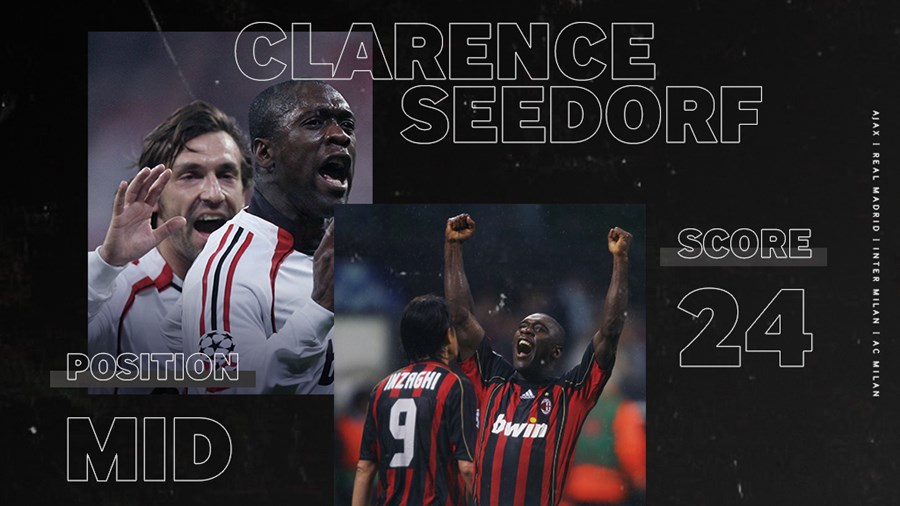
“This guy’s a gangster? His real name is Clarence.”
Clarence, as Eminem’s character B. Rabbit skilfully explained in the film 8 Mile, is a terrible first name for a battle rapper from Detroit.
For one of the Champions League’s finest ever playmakers, though, it’s perfect.
The name is elegant and sophisticated, just like Seedorf himself.
The Dutchman won the competition four times – only Ronaldo has won more – and remains the only player to do so with three different clubs: Ajax, Real Madrid and AC Milan. TB
12. EDWIN VAN DER SAR
“Anticipation,” sang Alex Turner on Arctic Monkeys’ The View From the Afternoon, “has the habit to set you up for disappointment.”
Not for Edwin van der Sar, who was so certain of saving Nicolas Anelka’s sudden-death penalty in the 2008 final in Moscow that he was smiling before he had even palmed it away.
Securing the Champions League for Manchester United was the Dutchman’s finest moment in the Champions League, and one which his career deserved.
Moscow was his second winners’ medal, having claimed his first with Ajax 13 years earlier. He also finished as a runner-up in three other finals, with his 2011 appearance in United’s defeat at Wembley his last ever match as a professional. TB
11. ZINEDINE ZIDANE
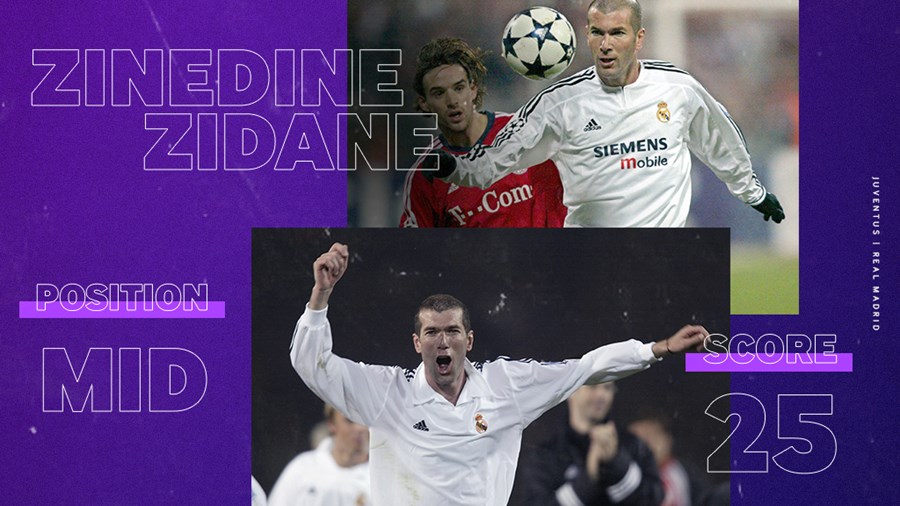
One Champions League win is perhaps a disappointing haul for a player as iconic as Zidane.
What a win it was, though.
The 2002 final will always be remembered for only one thing: Zizou’s winner, the greatest Champions League goal ever scored.
With Roberto Carlos’ cross dropping from what should have been an impossible height, the Frenchman swivelled and spanked a perfect volley – with his weaker foot – into the top corner.
But while Zidane was always capable of moments of utter brilliance, he was revered by his fellow players for his ability to control the game.
“When Zidane stepped on to the pitch, the 10 other guys suddenly got better,” Zlatan Ibrahimovic once said of the French legend.
His success as a manager makes it easy to forget what a player Zidane was. He was a truly complete midfielder.
Now if you don’t mind, I’m off to watch that volley another 100 times. JG
10. SAMUEL ETO’O
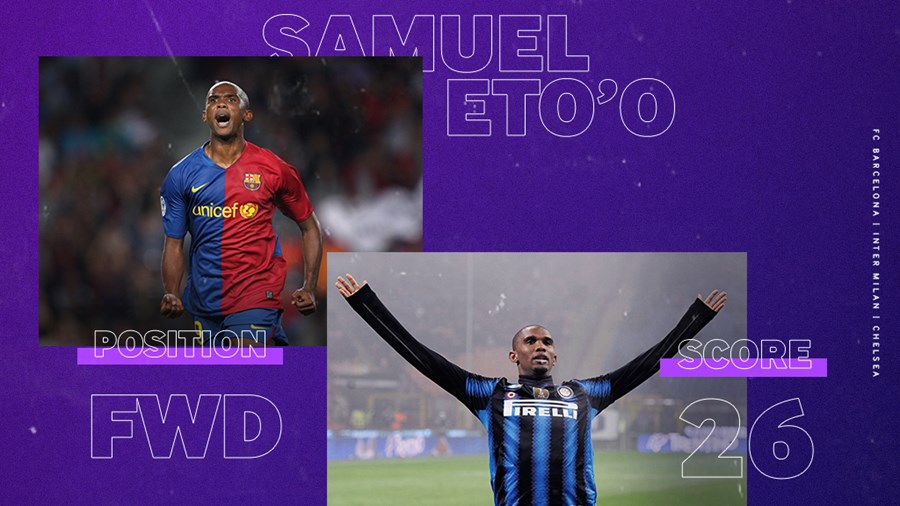
Eto’o must have felt very smug after winning the Champions League with Inter Milan in 2010.
A year earlier, he had been turfed out of Barcelona by Pep Guardiola, despite playing an integral role in them winning the same competition – scoring in the final against Manchester United – just a few weeks earlier.
Eto’o’s triumph with Inter was his third winners’ medal, all of which came in the space of five seasons.
His first came with Barcelona in 2006, scoring the equaliser in the final against Arsenal, having earlier drawn the foul by Jens Lehmann that reduced their opponents to 10 men.
Other strikers scored more goals in the competition, but few had a bigger impact on it than as Eto’o. TB
9. GARETH BALE
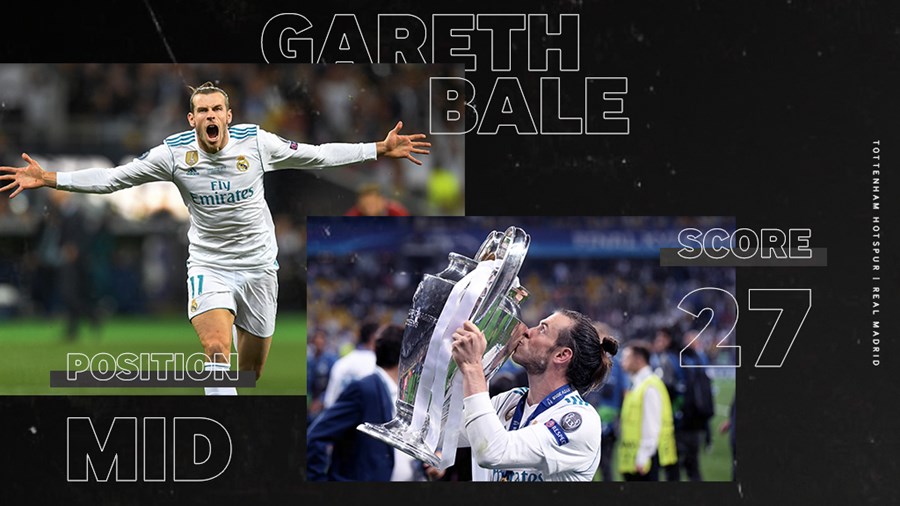
If Gareth Bale had enjoyed the Champions League career that he has had at Real Madrid for another club, you can be sure that Real Madrid would want to sign him.
It might be an indictment of Bale that he has only been able to deliver in fits and bursts.
But you’d take two of those fits and bursts being winning goals in the final, including arguably the best the competition has ever seen – fetching the ball from behind him to acrobatically beat Loris Karius from outside the area in 2018.
His European story began with that hat-trick against Inter Milan in the San Siro in October 2010, a brutal, illogical performance from a player who was meant to leave Spurs for Nottingham Forest months earlier.
Three years later, he was on his way to scoring six goals in eight starts as he won the competition for the first time.
Such flurries of individualism lend themselves to a comparison to Cristiano Ronaldo, but Bale has never sought that.
One comparison he may enjoy, though, is with Zinedine Zidane. He sits three places above his nemesis and current boss in our countdown. AD
8. XAVI
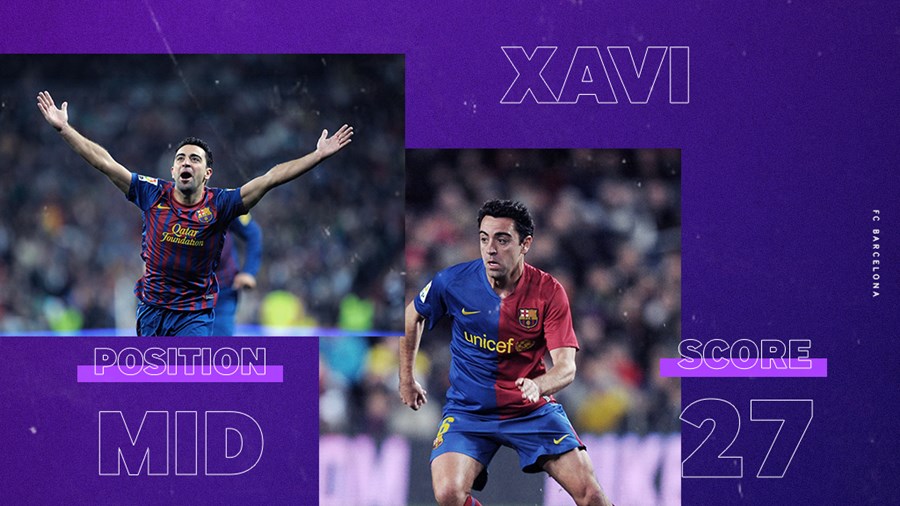
“I’m sure I saw him give the ball away once”.
Sir Alex Ferguson was only half-joking beforehand. By the time Xavi had dizzied Manchester United into submission in the 2011 Champions League final at Wembley, you can imagine the same words were formed purely from exasperation.
Xavi was known as the ‘Puppet Master’ in that iconic midfield trio, also including Sergio Busquets and Andres Iniesta. Not only could he control the game, finding space that nobody else knew existed to receive the ball, but he could befuddle opponents with his efficient use of it.
Several Lionel Messi masterclasses came against defenders whose brains were scrambled by Xavi.
Strangely, it took several years for him to receive much acclaim. He was criticised for only passing sideways and relying on the brilliance of team-mates until Guardiola took over at Barca and Spain began their monopoly over international football in 2008.
Retiring with three Champions League medals around his neck ensures that Xavi will ultimately be remembered for frustrating Ferguson and several others in a very different way. AD
7. IKER CASILLAS
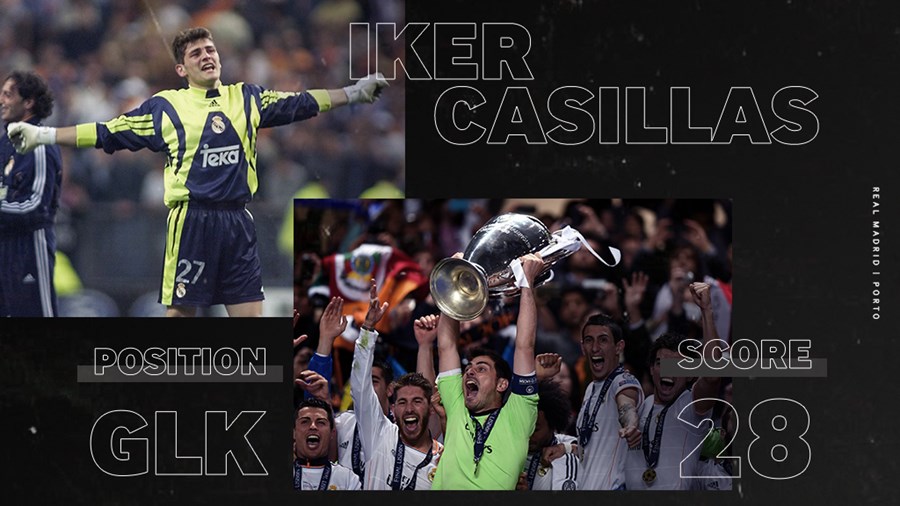
The highest-ranked goalkeeper in this list couldn’t be anyone else.
Casillas is the record appearance maker in Champions League history, though that shouldn’t come as a surprise given his longevity at the top of the game.
He became the youngest goalkeeper ever to play in and win a Champions League final after starting Real Madrid’s 3-0 win over Valencia in 2000, aged just 19.
Fourteen years later, he captained his side to La Decima.
That was their first European trophy since beating Leverkusen in 2002 with that Zidane volley, but one that heralded an unprecedented era of Champions League success for Real Madrid.
He was named the World’s Best Goalkeeper every year between 2008 and 2012 and is, according to Gianluigi Buffon, “the best of my era”.
That’s good enough for me. WR
6. PAOLO MALDINI
Maldini had already won the old European Cup twice before it was rebranded in 1992, which feels appropriate for the most timeless defender the Champions League has ever seen.
Over the next 15 years, he played in six more finals for AC Milan, alternating between playing at left-back and centre-half in each.
Of those, he won three, twice as captain, and was named man of match against Juventus in 2003 in the only final to finish 0-0.
And, to top it off, he did it all while looking like he belonged in a Federico Fellini film, reading the paper in some quiet Italian square while everybody else bustled frantically around him. TC
5. RAUL
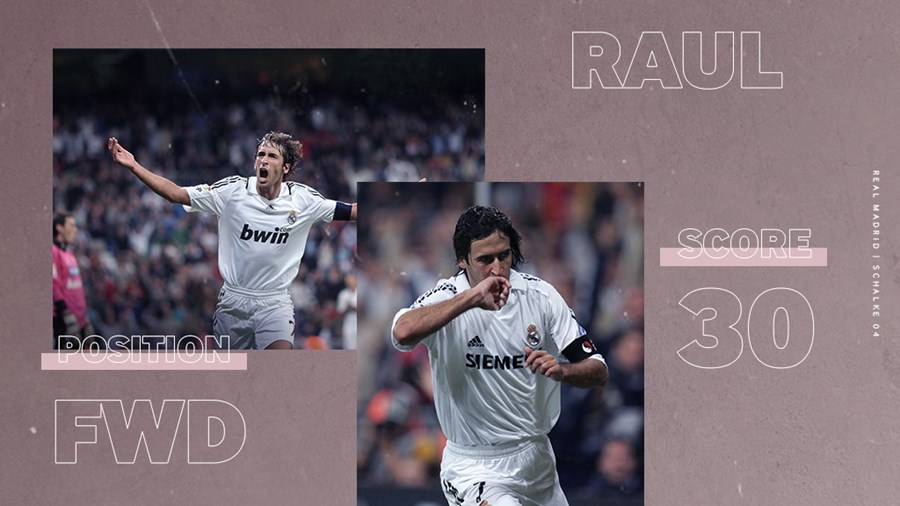
The boy before the boys arrived.
It’s difficult to consider now, but there was once a period before Lionel Messi and Cristiano Ronaldo landed from outer space and ruined football for everyone who has ever played against them.
No, honestly.
At that time, it was Raul who set the bar for ridiculous numbers.
Described by Pep Guardiola as ‘the most important player in Spanish football history’, he netted 72 goals in 142 Champions League appearances.
He was the player you would pretend to be in the playground and one you wanted on the back of your shirt.
He once said: “I think I started playing football before I was born.”
If you ever saw him on the pitch, that doesn’t seem as ridiculous as it first sounds. WR
4. ANDRES INIESTA
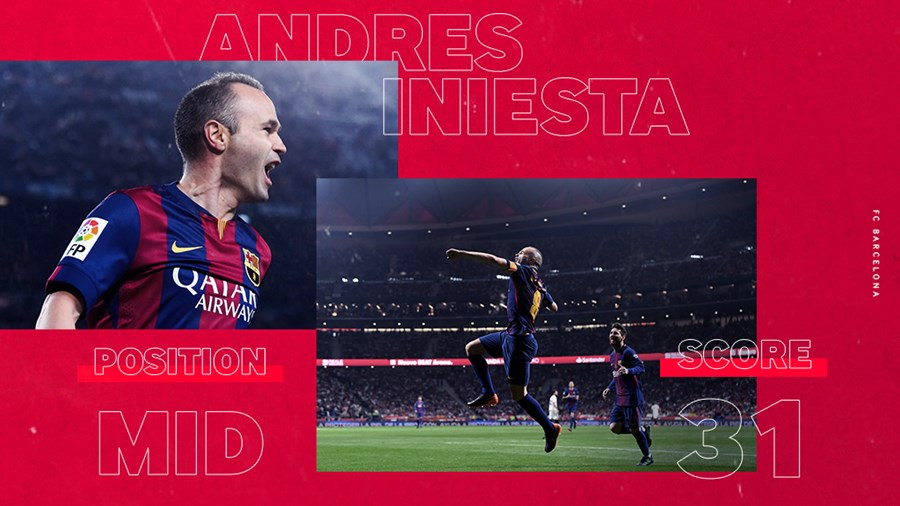
It’s impossible to discuss Andres Iniesta without immediately thinking of his stoppage-time winner against Chelsea in the 2008/09 semi-final at Stamford Bridge.
The ball across from Messi, the pinpoint outside-of-the-boot finish into the top corner, the shirt-off celebration, his yellow thermal undershirt.
Did I mention his finish with the outside of his boot? Pure box office.
But to fixate on one specific moment would be to do down the career of one of the greatest players in one of the most gifted teams in living memory.
Iniesta’s brilliance generally came from something less tangible than flashes of genius.
He didn’t score or assist a huge amount, but that didn’t matter. It was more about how he played, the tempo he set.
If intelligence on the pitch was denoted by IQ, Iniesta would be the football equivalent of Stephen Hawking. WR
3. SERGIO RAMOS
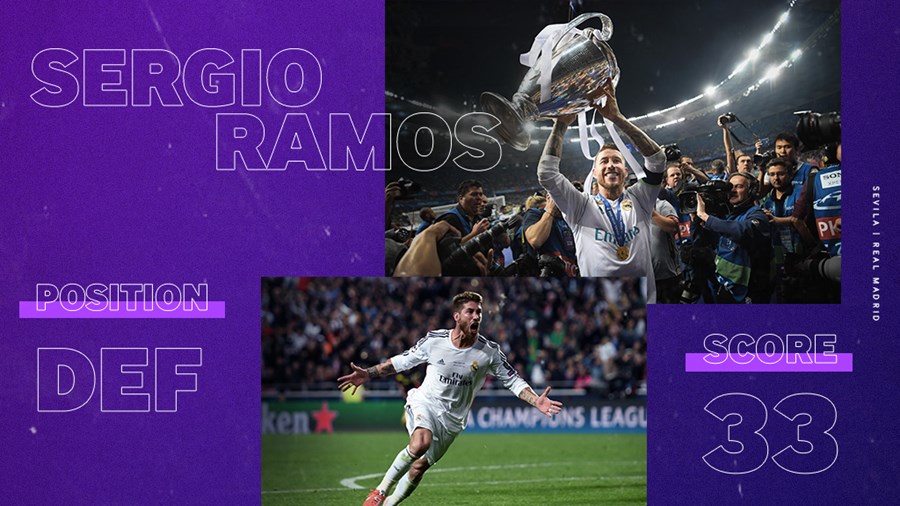
There have been many better players than Ramos in the Champions League, but few as impactful.
The Real Madrid captain embodied the side that won the competition four times between 2014 and 2018.
Simply put, he’s clutch.
It was Ramos who scored two headers in four minutes in the 2014 semi-final demolition of Bayern.
It was Ramos whose 93rd-minute equaliser forced extra-time in that year’s final, which Real went on to win 4-1 to complete La Decima.
And it was Ramos who scored his side’s only goal in the 2016 final, when Real beat Atletico in a penalty shoot-out.
Injuring Mohamed Salah and elbowing Loris Karius shortly before the Liverpool keeper’s first error in the 2018 final sealed Ramos’ spot as football’s ultimate shithouse, and no appraisal of his career can be complete without mentioning his deployment of the dark arts.
The Spaniard is much more than a cheat or a thug, though.
He’s a fantastic player, and – aside from the two players above him on this list – the most dominant force of will in this competition’s history. JG
2. LIONEL MESSI
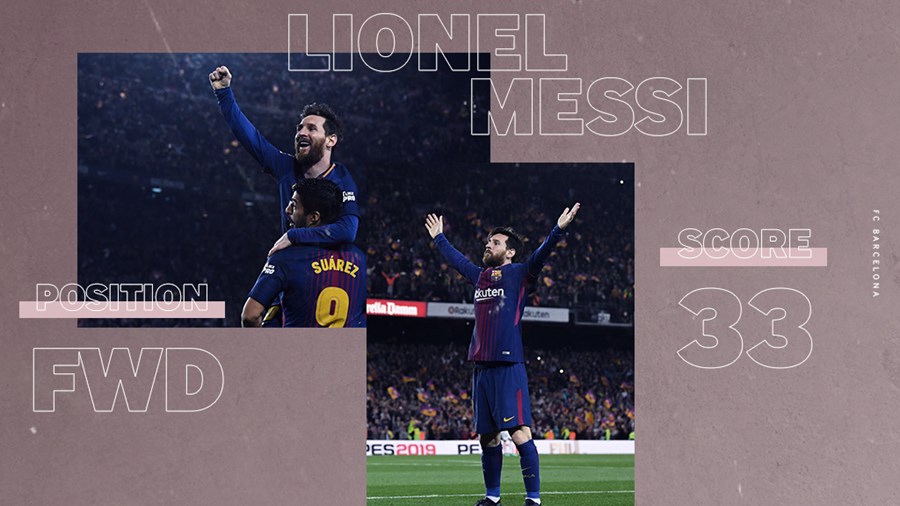
The Messi or Ronaldo argument has defined football for more than a decade, so, naturally, that’s what out countdown comes down to.
Ultimately, the decision wasn’t too difficult.
Messi’s Champions League medal tally (3) and goal tally (112) are freakish, but inferior to the man above (or, on this list, below) him. It is also undeniable that Barcelona have flopped in the Champions League since they lifted the 2015 title.
But, as you may have heard, we can enjoy them both.
Since making his debut in this competition as a 17-year-old, Messi has done things with a football that are unparalleled.
The four-goal haul against Arsenal in 2010, the dribble and finish in the Bernabeu in 2011. And the crowning glory, the shimmy past Jerome Boateng and chip over Manuel Neuer, 2015’s most tweeted about sporting and moment and UEFA’s goal of the season.
When neither of your goals in Champions League finals are the highlight of your career, something is going right.
These words don’t do him half the justice he deserves, but which words could? The GOAT isn't the Champions League GOAT, but it’s impossible to imagine he could’ve got much closer. AD
1. CRISTIANO RONALDO
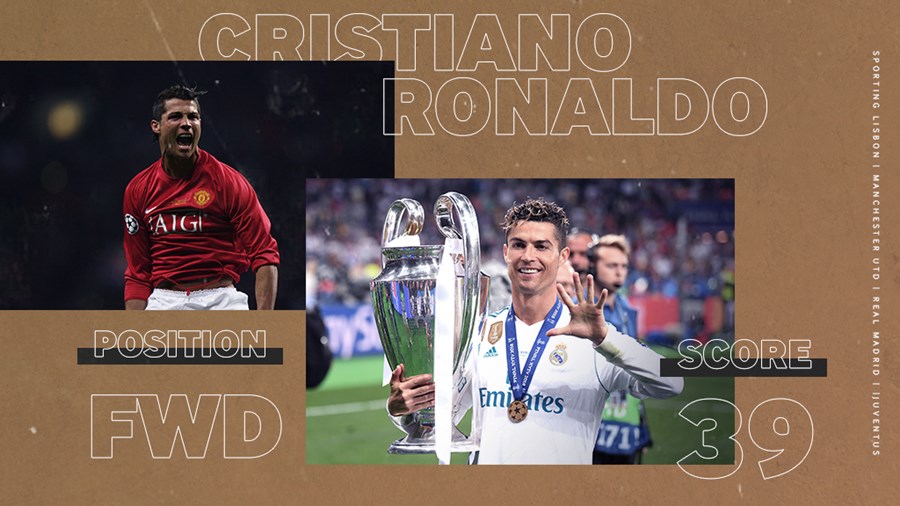
Ronaldo is, without a doubt, the Champions League’s greatest ever player – a remarkable achievement given that he has played at the same time as football’s greatest ever player, Lionel Messi.
Unlike a league season, where the best team always wins, the outcome of knockout football is more influenced by individual contributions. Players can bend the game to their will, and no player has done this more forcefully or as often as Ronaldo, whose five Champions League titles are the most of any player.
Having claimed his first with Manchester United in 2008, the Portuguese is the reason a good, but not great Real Madrid side won four between 2013 and 2018.
Ronaldo is both the competition’s greatest goalscorer – he has 126, over half of which have come in knockout games – and the scorer of the some of its greatest goals: the fearless header at Roma (2008), the 40-yard rocket at Porto (2009) and the counter-attack away at Arsenal (2009).
Incredibly, none of those were named the Champions League’s goal of the season, an award he has won three times: for his no-back lift dink against Liverpool (2014), his outrageous overhead kick against Juventus (2017) and over-the-shoulder volley against Manchester United (2018).
If you don’t remember all of those, don’t worry. Ronaldo, the Champions League GOAT, makes the ordinary extraordinary. TB
Visit Betway's football betting page.













